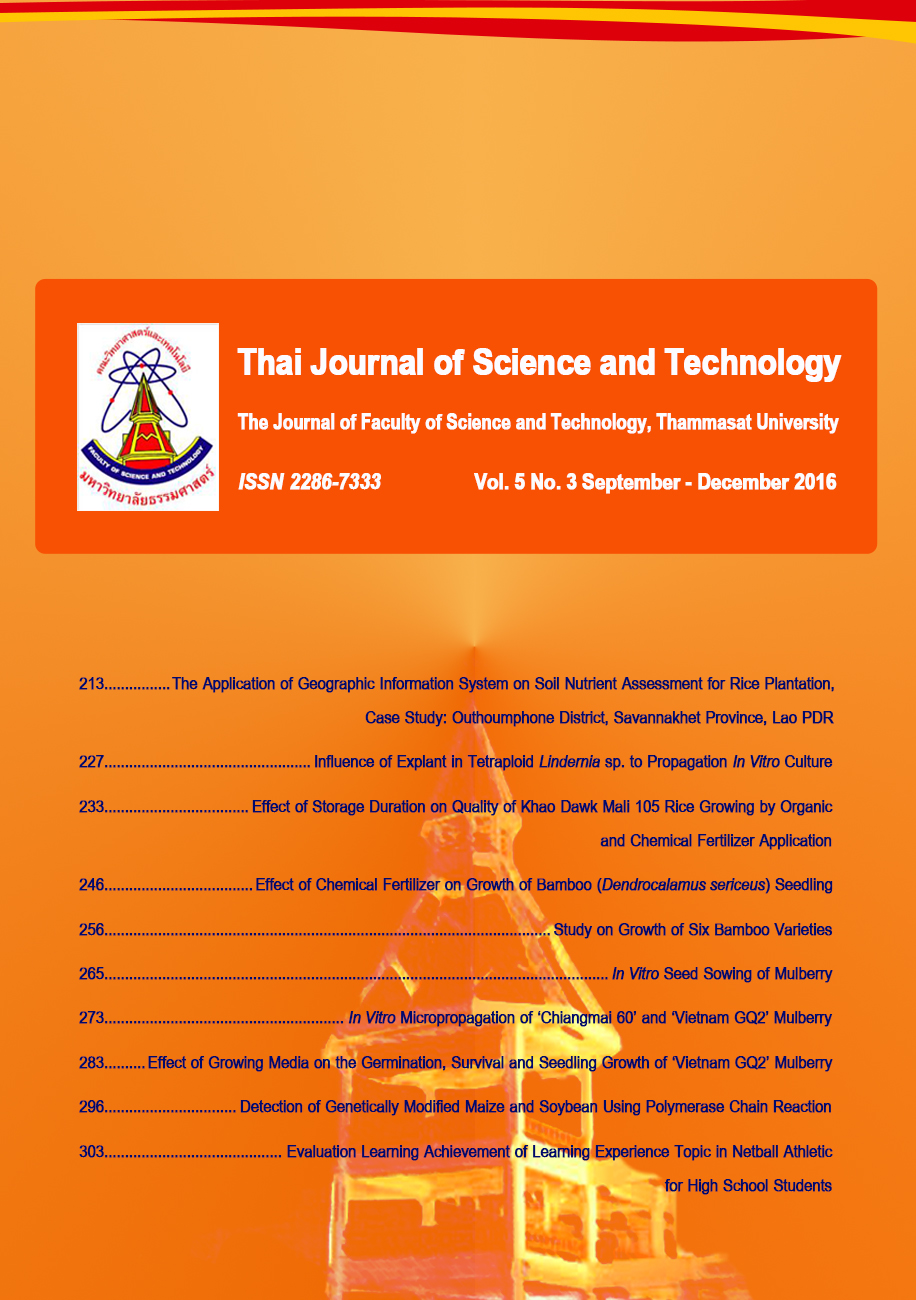ผลของระยะเวลาการเก็บรักษาต่อคุณภาพข้าวขาวดอกมะลิ 105 ที่ปลูกโดยใช้ปุ๋ยอินทรีย์และปุ๋ยเคมี
Main Article Content
Abstract
บทคัดย่อ
การศึกษาผลของระยะเวลาการเก็บรักษาต่อคุณภาพข้าวขาวดอกมะลิ 105 โดยสุ่มเก็บตัวอย่างข้าวจากแปลงเกษตรกร ตำบลสังขะ อำเภอสังขะ จังหวัดสุรินทร์ จำนวน 2 แปลง ที่มีการใช้ปุ๋ยแตกต่างกัน ได้แก่ นาข้าวใช้ปุ๋ยอินทรีย์ภายใต้มาตรฐานสินค้าเกษตรอินทรีย์ (มกษ. 9000-2552) ใช้ปุ๋ยมูลสุกรอัตรา 50 กก./ไร่ หรือ 1.35 กก.ไนโตรเจน/ไร่ และนาข้าวใช้ปุ๋ยเคมีภายใต้ระบบมาตรฐานสินค้าเกษตร (มกษ. 4400-2552) ใช้ปุ๋ยสูตร 16-16-8 และ 46-0-0 อัตรา 25 และ 15 กก./ไร่ ตามลำดับ ซึ่งคิดเป็น 10.9 กก.ไนโตรเจน/ไร่ บรรจุข้าวกล้องในถุงสูญญากาศ และเก็บรักษาในอุณหภูมิห้องเป็นเวลา 12 เดือน พบว่าระยะเวลาการเก็บรักษามีผลทำให้คุณภาพกายภาพ ได้แก่ น้ำหนัก ความกว้าง และหนาของเมล็ดเพิ่มขึ้น และมีผลทำให้คุณภาพทางเคมีเปลี่ยนแปลงไป โดยปริมาณคาร์โบไฮเดรตและอะไมโลสเพิ่มขึ้น แต่ปริมาณไขมันและสารความหอม (2-AP) ลดลง ซึ่งข้าวที่ปลูกโดยใช้ปุ๋ยอินทรีย์ยังคงมีปริมาณ 2-AP มากกว่าข้าวที่ปลูกโดยใช้ปุ๋ยเคมี จึงเป็นผลทำให้ข้าวที่ปลูกโดยใช้ปุ๋ยอินทรีย์มีกลิ่นหอมมากกว่า เช่นเดียวกับคุณภาพทางโภชนาการที่มีการลดลงตามการเก็บรักษา แต่ข้าวที่ปลูกโดยใช้ปุ๋ยอินทรีย์ยังคงมีปริมาณสารประกอบฟีนอลิกทั้งหมดในเมล็ดมากกว่าข้าวที่ปลูกโดยใช้ปุ๋ยเคมี และถึงแม้ว่าระยะเวลาการเก็บรักษามีผลทำให้ข้าวหุงสุกมีระยะเวลาการหุงต้มนานขึ้นและมีความนุ่มเหนียวลดลง แต่ข้าวที่ปลูกโดยใช้ปุ๋ยอินทรีย์ได้รับการยอมรับจากผู้บริโภคทั้งทางด้านรสชาติ กลิ่นหอม ความนุ่มเหนียวมากกว่าข้าวที่ปลูกโดยใช้ปุ๋ยเคมี ดังนั้นผลการทดลองนี้จึงชี้ให้เห็นว่าระยะเวลาการเก็บรักษามีผลทำให้คุณภาพข้าวขาวดอกมะลิ 105 ลดลง แต่ข้าวที่ปลูกโดยใช้ปุ๋ยอินทรีย์ยังคงมีคุณภาพดีและได้รับการยอมรับจากผู้บริโภคมากกว่าข้าวที่ปลูกโดยใช้ปุ๋ยเคมี ซึ่งเป็นผลมาจากความแตกต่างของปริมาณธาตุอาหารที่ได้รับจากปุ๋ย
คำสำคัญ : ข้าวขาวดอกมะลิ 105; ปุ๋ยเคมี; ปุ๋ยอินทรีย์
Abstract
Study on the effect of storage duration on quality of Khao Dawk Mali 105 rice variety from farmer’s rice field in Tambon Sungkha, Amphor Sungkha, Surin province. The Paddy was randomly collected from 2 rice fields with difference fertilizer application. The rice field applying organic fertilizer was maintained under Organic Agricultural Standard (TAS 9000-2009) by application of pig manure at the rate of 50 kg/rai or 1.35 kg of nitrogen (N)/rai. The rice field applying chemical fertilizer was produced under Thai Agricultural Standard (TAS 4400-2009). This was introduced with chemical fertilizer by 16-16-8 and 46-0-0 at rate of 25 and 15 kg/rai, respectively. There was 10.9 kg of N/rai. Brown rice was packed in vacuum plastic bag and stored for 12 months at room temperature. The results showed that the storage duration had increased some physical quality, such as weight, width and thick of grain. The chemical quality was changed during storage. The content of carbohydrate and amylose in grain were increased. Contrast to the content of fat and 2-acetyl-1-pyrroline (2-AP) that were decreased. The rice applying organic fertilizer had more 2-AP than the rice applying chemical fertilizer. This leaded to better aroma quality in rice applying organic fertilizer. Similarly, nutritional quality was decreased by the storage duration. The rice applying organic fertilizer had more content of total phenolic compound than those in the rice applying chemical fertilizer. In addition, the storage had resulted in extended cooking time and less softness of cooking rice. However, the rice applying organic fertilizer had more acceptance of customer, in term of taste, aroma, stickiness and softness, than the rice applying chemical fertilizer. Therefore, the results had indicated that the storage duration had resulted in declined quality of Khao Dawk Mali 105 rice. The rice applying organic fertilizer remains providing superior quality and giving more acceptance of customer than the rice applying chemical fertilizer. This is due to difference in nutrient supply of each fertilizer.
Keywords: chemical fertilizer, Khao Dawk Mali 105, organic fertilizer
Article Details
บทความที่ได้รับการตีพิมพ์เป็นลิขสิทธิ์ของคณะวิทยาศาสตร์และเทคโนโลยี มหาวิทยาลัยธรรมศาสตร์ ข้อความที่ปรากฏในแต่ละเรื่องของวารสารเล่มนี้เป็นเพียงความเห็นส่วนตัวของผู้เขียน ไม่มีความเกี่ยวข้องกับคณะวิทยาศาสตร์และเทคโนโลยี หรือคณาจารย์ท่านอื่นในมหาวิทยาลัยธรรมศาสตร์ ผู้เขียนต้องยืนยันว่าความรับผิดชอบต่อทุกข้อความที่นำเสนอไว้ในบทความของตน หากมีข้อผิดพลาดหรือความไม่ถูกต้องใด ๆ


